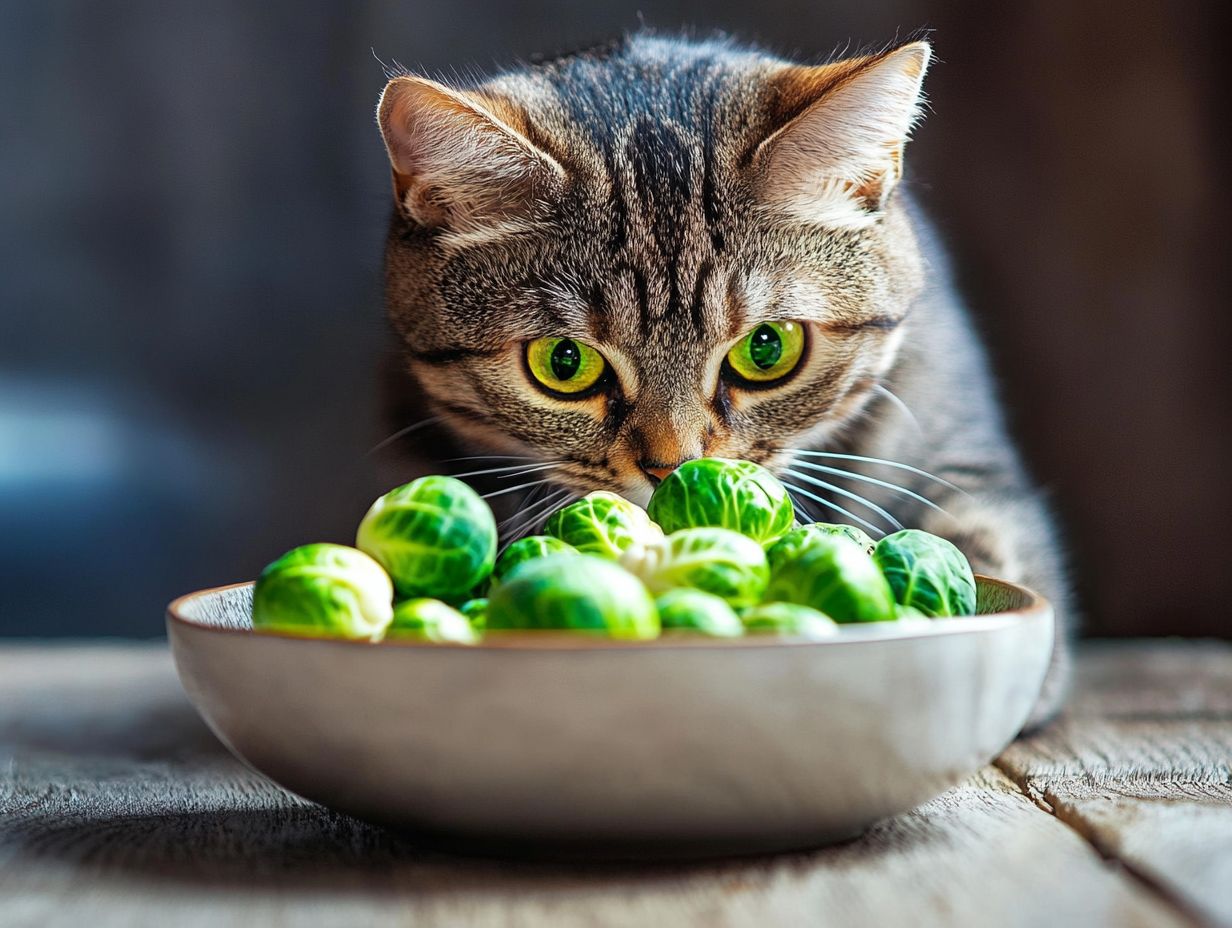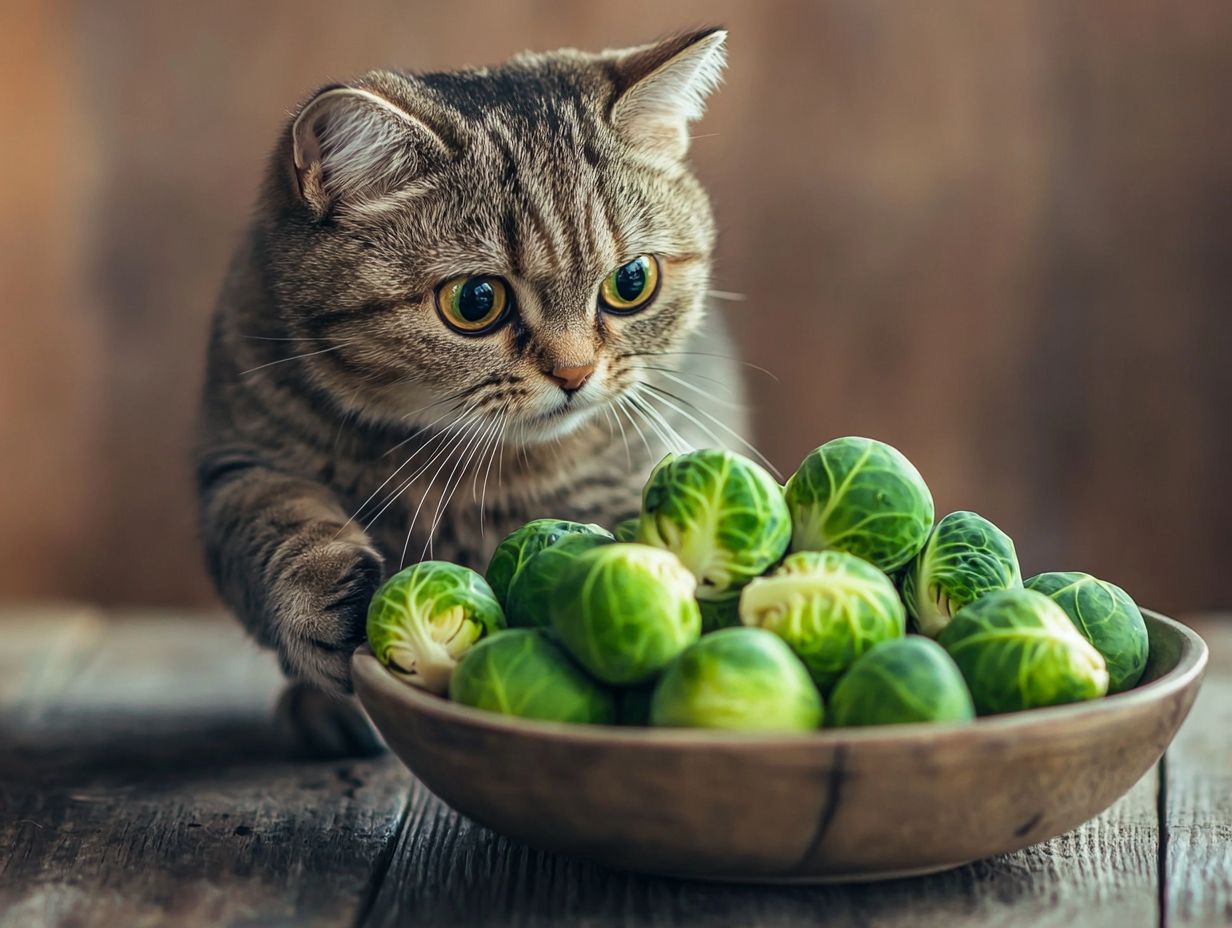Curious about whether Brussels sprouts can be a healthy addition to your cat’s diet? You’re not alone! Many pet owners wonder what foods are safe and beneficial for feeding cats, considering their unique nutritional demands. While Brussels sprouts can be offered to cats, they should not replace a balanced diet primarily focused on animal protein.
This article explores the nutritional value of Brussels sprouts, discusses potential risks like digestive issues and gastrointestinal discomfort, and offers tips on how to safely incorporate cooked sprouts into your cat’s meals.
Additionally, we highlight some nutritious alternatives to keep your kitty’s diet varied and healthy, including other vegetables and occasional treats. Read on to discover what’s best for your furry companion!
Key Takeaways:

- Brussels sprouts can be offered to cats but should not replace their primary diet of animal protein.
- Only serve cooked Brussels sprouts in very small quantities, such as a small piece or a tablespoon for an average-sized cat.
- If your cat has digestive issues or allergies, consult your veterinarian before introducing Brussels sprouts or any new food.
Can Cats Eat Brussels Sprouts?
Cats can eat Brussels sprouts in moderation, provided they are cooked properly to minimize the risk of digestive issues. Owners should observe their cat’s reaction and consult with veterinarians about appropriate portion sizes and cooking methods.
While Brussels sprouts are not toxic to cats, their digestive systems may struggle with raw sprouts, making cooked versions a better choice for occasional treats or a way to increase veggie intake.
Nutritional Benefits
Brussels sprouts (Brassica oleracea) are recognized for their unique flavor and are a nutrient-dense vegetable. When fed in moderation, they can provide various vitamins and minerals that may benefit cats, including potential weight management benefits.
Beneficial Nutrients and Vitamins

Brussels sprouts are rich in several beneficial nutrients, including fiber, omega-3 fatty acids, vitamin C, and vitamin K, all of which contribute positively to a cat’s health. Fiber promotes healthy digestion, while omega-3 fatty acids are essential for promoting a shiny coat and healthy skin. Meanwhile, vitamin C plays a vital role in immune function, and vitamin K is crucial for blood clotting and bone health.
Preparation Guidelines
Brussels sprouts should be given to cats after being cooked—either by steaming or boiling—to ensure they are easy to digest and free from harmful bacteria. The cooking process helps retain the nutritional value of Brussels sprouts while softening their texture, making them more palatable for cats. Start with one small sprout and adjust based on their reaction.
To prepare Brussels sprouts, start by rinsing them thoroughly under cold water to remove dirt and pesticides. Next, trim the ends and remove any discolored outer leaves.
For steaming, place the sprouts in a steamer basket over boiling water and steam them for 5 to 7 minutes, or until they are tender enough to pierce with a fork. For boiling, place the sprouts in salted boiling water for the same duration, ensuring they simmer until tender. Always allow them to cool before serving.
Possible Risks
As with any new food, there is a possibility of allergic reactions or sensitivities. Brussels sprouts can lead to digestive issues like gastrointestinal discomfort, which can manifest as bloating, gas, or vomiting. Monitor your cat’s response closely when introducing Brussels sprouts or any new food into their diet.
Signs of Allergic Reactions
Common symptoms indicating adverse effects include changes in appetite, lethargy, or unusual litter box habits. If severe symptoms such as vomiting or diarrhea occur, withhold all food for a few hours and ensure the cat stays hydrated. In such cases, seek veterinary attention if severe symptoms persist.
Alternatives to Brussels Sprouts for Cats
Brussels sprouts can be a healthy addition to a cat’s diet; however, alternatives such as steamed veggies can also provide significant nutritional benefits. Other healthy options for cats include carrots, peas, and spinach, all of which can positively contribute to their nutritional intake.
These vegetables are rich in essential vitamins and minerals. For example, carrots provide vitamin A, which supports vision and immune function, while spinach contains vitamin K, which is beneficial for blood health.
To incorporate these vegetables into a cat’s diet, mix small, cooked portions into their regular food, ensuring that they are chopped into manageable sizes to prevent choking. It is vital to monitor the cat’s reaction, as some may have sensitivities or preferences for certain flavors. Moderation is key; while these vegetables offer health benefits, a balanced diet with appropriate animal protein remains essential to meet their nutritional needs.
Frequently Asked Questions
Many cat owners wonder if Brussels sprouts are safe for their feline friends. This article discusses the safety, benefits, and guidelines for feeding Brussels sprouts to cats.
Can cats eat Brussels sprouts?

Yes, cats can safely eat Brussels sprouts in moderation as part of a healthy diet.
Are Brussels sprouts a healthy option for cats?
Brussels sprouts are a great source of fiber, vitamins, and minerals for cats, making them a healthy option when fed in moderation. Always verify nutritional claims with trusted veterinary sources.
How should Brussels sprouts be prepared for cats?
Cook and chop Brussels sprouts into small pieces before giving them to cats to prevent choking and make them easier to digest. Always introduce new foods gradually to your cat’s diet to monitor for any adverse reactions.
What are the benefits of feeding Brussels sprouts to cats?
Brussels sprouts can improve digestion, promote a healthy immune system, and provide antioxidants for cats when incorporated into their diet.
How much Brussels sprouts can cats eat?
Cats should only have a small amount of Brussels sprouts as a treat. A recommended portion is about a teaspoon of cooked and chopped Brussels sprouts per 5 pounds of body weight, as large portions can cause digestive issues or an upset stomach.
Can Brussels sprouts be toxic to cats?
No, Brussels sprouts are not toxic to cats but may cause digestive upset if eaten in large quantities. Watch for symptoms like gas, diarrhea, or vomiting if your cat consumes too many.
Conclusion
In summary, while Brussels sprouts can be a safe and healthy treat for cats in moderation, always prioritize a balanced diet rich in animal protein. Consult your veterinarian before making dietary changes to ensure your cat’s health and well-being.